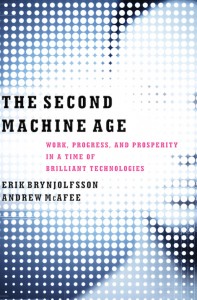Soon after 2020, service and knowledge workers might begin to see their own personal Intelligent Assistant as the key to their workplace success.
The age of the Intelligent Assistant is close but will take years and decades to unfold. Rather then envision Hal from 2001:A Space Odesssy or dream of Scarlett Johannsen’s voice “Samantha’ from the movie Her — focus on understanding the implications of systems like IBM Watson or Kensho’s Warren at work.
Underneath these intelligent assistants is a complex world of code based on artificial intelligence –but on the surface it will feel more like natural human conversations we have today. Forget typing, swyping or clicking– we will speak and be able to ask us questions through a conversation interface.
Most importantly the intelligent assistant will do the heavy lifting of the most mundane routine tasks and data-intensive workflows to free up humans to do our best thinking.
Should I be afraid or excited? Or both?!
Rather than get fixated on the dystopian vision of working ‘for’ intelligent machines, imagine we will likely work ‘with’ these software agents to improve how we learn, make decisions and collaborate. There will be significant challenges in reshaping social norms at work and understanding issues such as control over key data and algorithms that drive my Intelligent Assistant? Who might held liable if a computer aided decision is wrong? Or what if I leave my current company – can I take my intelligent assistant with me…? Could we be hired by a new company based on the strength of our relationship with artificial intelligence systems? Lots of implications to explore?
This is a classic story of the ‘slow pace to disruptive change’.
Yet, 2020 is a reasonable time horizon to expect early adoption in fields like healthcare (via IBM Watson) and finance (Kensho’s Warren).
Here are a few resources to learn more about this coming wave of disruptive cognitive computing applications:
>>>Book: The Second Machine Age >>>
Will we work ‘for’ machines? Or work ‘with’ machines?
There are two basic stories about the future of radical forms of information technology. The first story is computing machines transformed by artificial intelligence take over the vast majority of work activities dominated by humans. This is a vision of the future the often follows shocking headlines like: the End of Work or Meet Your Robot Boss.
The other story is a world where human plus machines work together to produce the most beneficial outcomes in productivity and creative problem solving. This is a future where humans do what they do best – and computers do what they do best. Cross your fingers and hope it works out! Or look back at history and learn how society has already made these types of transitions in the past.
Erik Brynjolfsson and Andrew Mcafee’s book The Second Machine Age explores a world being reshaped by radical technologies around artificial intelligence, 3d printing, robotics, et al. They borrow from the social history of the first ‘machine age’ and the industrial revolution and provide a set of prescriptions that says to balance radical technologies you need bold investments in civic institions, companies, and public sector that can drive social change that elevates the role of lifelong learning and adaptiation to this new era.
A few video clips with Erik and Andrew:
12 minute interview with Andrew Keen
>>> IBM Watson >>>
IBM’s vision of the intelligent assistant is best captured in IBM Watson and their framing of these early days of Cognitive Computing – an era where software systems learn on their own and can teach themselves how to improve their performance. IBM Watson is today’s most sophisticated cognitive computing application – but others are not too far behind.
Watson is currently providing decision support for cancer treatments at Sloan Kettering, financial service support for companies such as ANZ and CitiGroup, and working to evolve the retail customer experience for Northface.
IBM Watson and Financial Sector
IBM Watson – Discovery Advisor
>>> Sector Specific Solutions >>>
We are years – if not decades away from an all purpose Intelligent Assistant that can learn about any industry or subject domain without human involvement.
Instead we should imagine knowledge work solutions coming into specific sectors.
The most likely early adopters? Healthcare and Finance.
Financial Services: Asking Natural Language Questions?
Kensho’s Warren (link to video) is a natural language interface that provides analytics and market information context to investment professionals.
Through Warren you can ask natural questions:
How might the price of oil be impacted if there was x-event in the world?
What might happen to the price of x-stock if there is a hurricane next week?
<<< Follow Sean Gourley….>>>
One of the strongest advocates of this vision of working ‘with’ machines, not ‘for’ machines is Sean Gourley, CEO of Quid. The following talk is from the March 2014 GigaOm Data Structure Conference.
***


